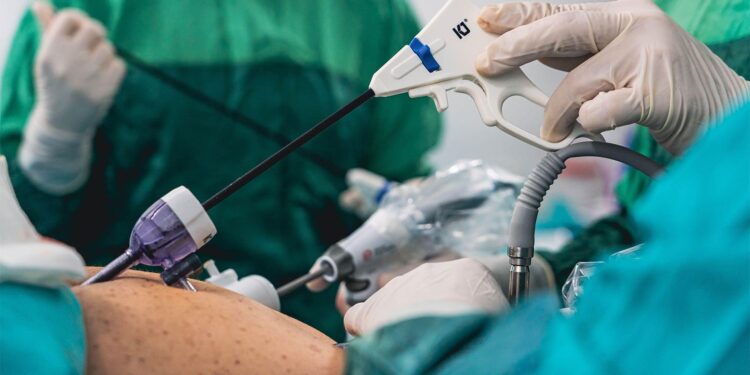[ad_1]
Bariatric surgery significantly reduced long-term risk for decompensation and adverse outcomes in patients with obesity and compensated metabolic dysfunction-associated steatohepatitis (MASH)-related cirrhosis, according to an observational study.
In 62 patients who underwent bariatric surgery, the 15-year cumulative incidence of major adverse liver outcomes was 21% compared with 46% in control patients treated non-surgically (adjusted HR 0.28, 95% CI 0.12-0.64, P=0.003), reported Steven Nissen, MD, of the Cleveland Clinic, and colleagues.
The 15-year cumulative incidence of decompensated cirrhosis was 16% in the surgical group versus 31% in the non-surgical group (adjusted HR 0.20, 95% CI 0.06-0.68, P=0.01), the study authors detailed in Nature Medicine.
“Currently, lifestyle intervention is the only therapeutic recommendation for compensated MASH-related cirrhosis,” Nissen said in a statement. “However, lifestyle changes alone rarely provide the weight loss and metabolic changes needed to reduce the risk of liver complications in this patient population. The SPECCIAL study shows that bariatric surgery is an effective treatment that can influence the trajectory of cirrhosis progression in select patients.”
Patients in the surgery group lost a mean of 32 kg (27% of their body weight) 15 years after surgery. “That durable weight loss was sufficient to prevent the progression of compensated cirrhosis to end-stage liver disease,” the study authors noted.
One potential implication of the study is that bariatric surgery could help MASH patients with obesity and decompensated cirrhosis eventually obtain liver transplants, the researchers suggested. Severe obesity is a contraindication to liver transplantation at many centers because of the increased risk of post-transplant morbidity. Surgically induced weight loss, however, could convert the eligibility status of patients with severe obesity.
Another implication is that it appears to be safe to undergo bariatric surgery even if someone has cirrhosis as long as the cirrhosis is compensated, said Wajahat Mehal, MD, DPhil, of the Yale School of Medicine in New Haven, Connecticut, who was not involved in the study. This is good news for patients with obesity and liver disease who might need bariatric surgery for other reasons, such as bad knees or sleep apnea, he said.
“It actually does seem to significantly help the liver as well. Which is frankly not a surprise. It’s what I would have predicted,” added Mehal, who is a volunteer for the American Liver Foundation. “But it’s obviously good to see that actually is the case.”
However, “I would strongly recommend that bariatric surgery in patients with cirrhosis be done in large medical centers that are familiar with operating on people with cirrhosis,” he cautioned. “This is not a carte blanche for every small hospital to go ahead and start doing this.”
Conducting a sufficiently powered randomized clinical trial with adequate follow-up to assess how a treatment impacts long-term outcomes in patients with MASH-related cirrhosis would be challenging, Nissen and colleagues said. Therefore, the team conducted a carefully designed observational study.
The SPECCIAL (Surgical Procedures Eliminate Compensated Cirrhosis in Advancing Long-Term) study included 168 patients with obesity and compensated histologically proven MASH-related cirrhosis; mean age was 54.4 years, mean body mass index was 42.7, and 69.6% were women.
Sixty-two participants who underwent metabolic surgery, including Roux-en-Y gastric bypass (n=37) and sleeve gastrectomy (n=25), were compared with 106 nonsurgical control patients. Mean follow-up was 10.0 ± 4.5 years.
Efficacy outcomes included 15-year cumulative incidence of major adverse liver outcomes and decompensated cirrhosis. Key baseline variables such as type 2 diabetes, Fibrosis-4 score, and Ishak fibrosis score were precisely balanced between the study groups by overlap weighting techniques, which can reproduce many key aspects of randomized trials, Nissen and colleagues said.
In addition, the statistical models were fully adjusted based on several other covariates including Charlson Comorbidity Index score, insulin use, and smoking status by using Firth’s method, which can increase the precision of estimates in Cox proportional hazard models, the study authors explained.
Previous studies reported benefits for metabolic surgery in patients with MASH but without cirrhosis. The current study is the first to assess long-term clinical outcomes after metabolic surgery in patients with obesity and MASH-related cirrhosis.
A key limitation, however, was that data on physical activity, dietary habits, alcohol use, and smoking status during long-term follow-up were not available. Patients who underwent metabolic surgery could have adopted healthier lifestyles than the nonsurgical control group, leading to healthy user bias, the researchers noted. Also, 90% of study patients were white, limiting the generalizability of the results to other racial and ethnic groups.
Disclosures
No funding source was reported for this study.
Nissen reported receiving grants to perform clinical trials from AbbVie, AstraZeneca, Amgen, Bristol Myers Squibb, Eli Lilly, Esperion Therapeutics, Medtronic, MyoKardia, New Amsterdam Pharmaceuticals, Novartis, and Silence Therapeutics. Co-authors reported multiple relationships with industry.
Primary Source
Nature Medicine
Source Reference: Aminian A, et al “Long-term liver outcomes after metabolic surgery in compensated cirrhosis due to metabolic dysfunction-associated steatohepatitis” Nat Med 2025; DOI: 10.1038/s41591-024-03480-y.
[ad_2]
Source link : https://www.medpagetoday.com/gastroenterology/generalhepatology/113935
Author :
Publish date : 2025-01-27 10:00:00
Copyright for syndicated content belongs to the linked Source.


![author['full_name']](https://newshealth.biz/wp-content/uploads/2025/01/Bariatric-Surgery-in-MASH-Patients-Improved-Long-Term-Outcomes.jpg)












